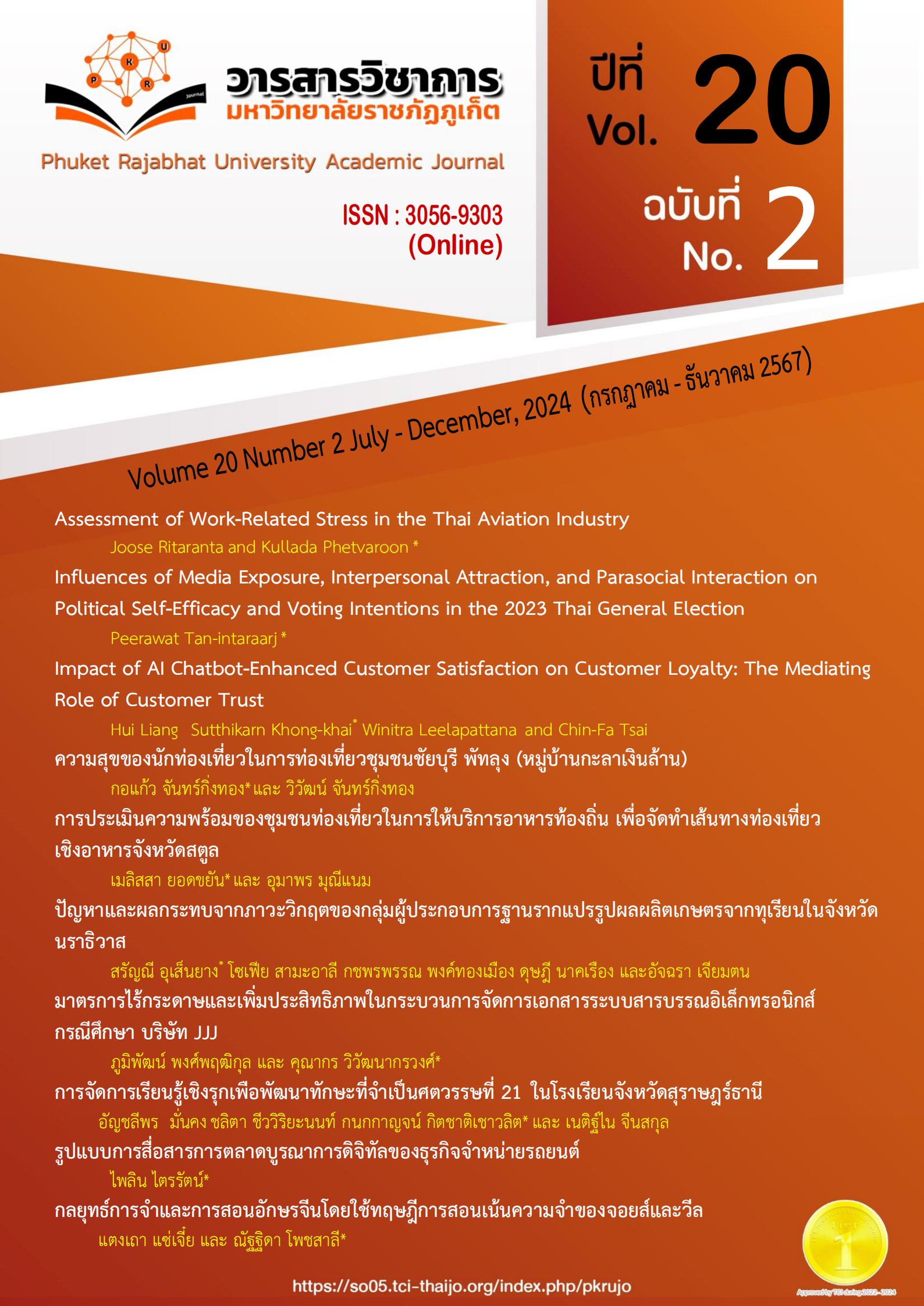การประเมินความพร้อมของชุมชนท่องเที่ยวในการให้บริการอาหารท้องถิ่น เพื่อจัดทำเส้นทางท่องเที่ยวเชิงอาหารจังหวัดสตูล
Main Article Content
บทคัดย่อ
บทความนี้มีวัตถุประสงค์เพื่อประเมินความพร้อมของชุมชนท่องเที่ยวในการให้บริการอาหารท้องถิ่น จากตัวแทน 6 ชุมชนภายใต้เครือข่ายการท่องเที่ยวโดยชุมชนจังหวัดสตูล เพื่อจัดทำเส้นทางท่องเที่ยวเชิงอาหารจังหวัดสตูล โดยประเมินจาก 2 ส่วน คือชุมชนประเมินตนเอง (n = 12) และประเมินจากนักท่องเที่ยวที่เคยใช้บริการอาหารของชุมชน (n = 402) ภายใต้กรอบมาตรฐาน 4 ด้าน ได้แก่ ด้านการจัดการทรัพยากร/วัตถุดิบที่เป็นมิตรกับสิ่งแวดล้อม มาตรฐานอาหารและความปลอดภัย การบริการนักท่องเที่ยว และกิจกรรมการท่องเที่ยวเชิงอาหาร ใช้วิธีการวิจัยแบบผสมผสาน (Mixed Methods) ระหว่างการวิจัยเชิงปริมาณเพื่อประเมินและจัดลำดับความพร้อมชุมชน เก็บข้อมูลโดยใช้แบบสอบถาม 2 ชุด วิเคราะห์ข้อมูลทางสถิติโดยหาค่าความถี่ ร้อยละ ค่าเฉลี่ย และส่วนเบี่ยงเบนมาตรฐาน และการวิจัยเชิงคุณภาพใช้การสัมภาษณ์เชิงลึกตัวแทนชุมชน และ 8 หน่วยงานที่เกี่ยวข้องกับการท่องเที่ยว (n = 8) เพื่อพิจารณารูปแบบการจัดการท่องเที่ยวโดยชุมชน ร่วมด้วยการสังเกต และการวิจัยเอกสาร ทำการวิเคราะห์เนื้อหาเชิงพรรณา (Content Analysis) ผลการประเมินตนเองของชุมชน พบว่า ภาพรวมชุมชนมีความพร้อมในระดับมาก ด้านที่มีความพร้อมมากที่สุด คือมาตรฐานอาหารและความปลอดภัย รองลงมาคือการจัดการทรัพยากร/วัตถุดิบที่เป็นมิตรกับสิ่งแวดล้อม ผลการประเมินจากนักท่องเที่ยวภาพรวมชุมชนมีความพร้อมในระดับมาก ด้านที่ได้คะแนนสูงสุดคือมาตรฐานอาหารและความปลอดภัย รองลงมาคือกิจกรรมการท่องเที่ยวเชิงอาหาร จากนั้นคัดเลือกชุมชนเพื่อจัดทำเส้นทางท่องเที่ยวเชิงอาหารภายใต้เงื่อนไขคือ ชุมชนต้องมีความพร้อมระดับมากขึ้นไปจากการประเมินทั้งสองส่วน และมีรูปแบบการจัดการท่องเที่ยวโดยชุมชน ผลการศึกษามี 2 ชุมชนผ่านเงื่อนไขการประเมิน ได้แก่ 1) ชุมชนท่องเที่ยวบ้านโตนปาหนัน-บ่อน้ำร้อน มีความพร้อมมากที่สุด และ 2) ชุมชนท่องเที่ยวบ้านบ่อเจ็ดลูก มีความพร้อมระดับมาก นำมาจัดทำเส้นทางท่องเที่ยวเชิงอาหารจังหวัดสตูลได้ 3 เส้นทาง ได้แก่ เส้นทางท่องเที่ยวเชิงอาหารโซนเขา โซนเล และเส้นทางท่องเที่ยวเชิงอาหารเชื่อมโยงโซนเขาและทะเล
Article Details

อนุญาตภายใต้เงื่อนไข Creative Commons Attribution-NonCommercial-NoDerivatives 4.0 International License.
เนื้อหาและข้อมูลในบทความที่ลงตีพิมพ์ในวารสารวิชาการมหาวิทยาลัยราชภัฏภูเก็ต ถือเป็นข้อคิดเห็นและความรับผิดชอบของผู้เขียนบทความโดยตรง ซึ่งกองบรรณาธิการวารสารฯ ไม่จำเป็นต้องเห็นด้วยหรือร่วมรับผิดชอบใด ๆ
บทความ ข้อมูล เนื้อหา รูปภาพ ฯลฯ ที่ได้รับการตีพิมพ์ในวารสารวิชาการมหาวิทยาลัยราชภัฏภูเก็ต ถือเป็นลิขสิทธิ์ของวารสารวิชาการมหาวิทยาลัยราชภัฏภูเก็ต หากบุคคลหรือหน่วยงานใดต้องการนำทั้งหมดหรือส่วนหนึ่งส่วนใดไปเผยแพร่ต่อหรือเพื่อกระทำการใด ๆ จะต้องได้รับอนุญาตเป็นลายลักษณ์อักษรจากวารสารวิชาการมหาวิทยาลัยราชภัฏภูเก็ตก่อนเท่านั้น
เอกสารอ้างอิง
Bhumisiripaiboon, K., Lamwunnawong, S., Buddalert, P., & Wankam, P. (2018). The Study of The Potential of Gastronomy Tourism Activities in South I-SAN zone; Nakhon Ratchasima, Buriram, Surin, Sisaket, Ubon Ratchathani: Subject no. 3 The Development of Gastronomy tourism routes and activities. TRD: Tourism Research and Development Center by NRRU. Nakhon Ratchasima Rajabhat University. Retrieved from https://www.trdnrru.net/projects.html
Chumnanchar, B. (2018). Gastronomy Tourism: Thailand’s Competitiveness (pp.107-116), Academic article. APHEIT Journal of Association of Private Higher Education Institutions of Thailand. Vol. 24, (1) January - June 2018.
Department of Tourism, Ministry of Tourism and Sports. (2013). Food Service Standard for Tourism (6th ed.). Bangkok: Chulalongkorn University Press.
Designated Areas for Sustainable Tourism Administration (Public Organization) [DASTA]. (2016). Gastronomy Tourism: ท่องเที่ยวเชิงอาหาร (1st ed.). Bangkok: COCOON & CO.
Garibaldi, R. & Pozzi, A. (2018). Creating tourism experiences combining food and culture: an analysis among Italian producers. Journals Tourism Review, VOL.73 NO. 2, (p. 230-241). DOI 10.1108/TR-06-2017-0097
GEO-Informatics Research Center for Natural Resources and Environment. (2023) : Linking gastronomic route between 2 communities [map]. GEO-Informatics Research Center for Natural Resources and Environment. Faculty of Environmental Management, Prince of Songkla University.
Hall, C.M. & Sharples, L. (2003). Food Tourism Around The World: The consumption of experiences or the experience of consumption? An introduction to the tourism of taste. Butterworth-Heinemann.
Jullasilp, K. (2018). Marketing management strategy for food tourism promotion of Thai tourist in Pha Nakhon Si ayutthaya Province. [Master’s thesis]. National Institute of Development Administration [NIDA].
Jussapalo, C. (2018). Potential Tourism Resources and Strategies for Tourism Development in Songkhla Lake Basin. Proceeding of The International and National Conference in Business Administration and Accountancy 2018 (INCBAA2018), (pp. 567-580). Faculty of Business Administration and Accountancy (KHON KAEN Business School: KKBS), Khon Kaen University. Thailand.
Ministry of Tourism and Sports, Thailand (2019). The Development of ASEAN Gastronomy Network and Region of Gastronomy, White Paper, 2019. (ATF 2019- ASEAN Tourism Ministerial Meeting). Asean Region of Gastronomy. Perfect Link Consulting Group.
Ministry of Tourism and Sports. (2020). Tourism Statistics 2019. Retrieved from https://www.mots.go.th/news/category/617
National Tourism Policy Committee. (2019). เกณฑ์การพัฒนาการท่องเที่ยวโดยชุมชนของประเทศไทย. (n.p.) (In Thai)
Panyadee, T., Khunwong N., Tungchawal, K., Pieonoi, P., & Piemsanga, C. (2022). Generating Creative Tourism Routes within Phetchaburi through the Innovative use of Local Food Products. Journal of Humanities and Social Sciences Review (JHSSR). Vol.24 No.1 January-June 2022. Retrieved from https://so05.tci-thaijo.org/index.php/hspbruacthjournal/article/view/259442
Pattarat. (2020) “ท่องเที่ยวเชิงเกษตร” เทรนด์ที่กำลังมาแรง เมื่อคนเมืองอยากสัมผัสชีวิตชนบท หนี COVID-19 (In Thai). Positioning Magazine Online./Global Trend, 27 July 2020. Retrieved from https://positioningmag.com/1289665
Satun Community College. (2012). Satun Culture and Food Encyclopedia: Satun Culture and Way of Life, Volume 1. Songkhla: Pimpakarn.
Satun Provincial Office. (2023). Annual Report 2023. Retrieved from https://www.satun.go.th/files/com_news_devpro1/2023-12_a7ee9cbaac7114c.pdf)
Satun Provincial Office of Tourism and Sports. (2021). List of Satun Community Based Tourism Network as of September 2021 [Unpublished paper].
Sirichodnasakorn, C. (2016). The Development of Creative Local Food Innovation for Tourism Products in Petchaburi and Prachuap Khiri Khan Provinces. [Doctoral dissertation] Graduate school, Silpakorn University.
Tansakul, P. (2020). Guidelines to Promoting Local Cuisine for Gastronomic Tourism: Case study of Khanab Nak Community, Pak Phanang District, Nakhon Si Thammarat Province. WMS Journal of Management, 9(1), pp. 81–92. Retrieved from https://so06.tci- thaijo.org/ wms/article/view/237906
Testa, R., Galati, A., Schifani, G., Trapani, A. M. & Migliore, G. (2019). Culinary Tourism Experiences in Agri-Tourism Destinations and Sustainable Consumption—Understanding Italian Tourists’ Motivations. Journals Sustainability Volume 11. Retrieved from https://doi.org/10.3390/su11174588
The Food and Agriculture Organization of the United Nations [FAO]. (2018). Sustainable food systems: Concept and framework. Retrieved from http://www.fao.org/3/ca2079en/ CA2079EN.pdf
The World Tourism Organization [UNWTO]. (2019). Gastronomy Tourism – The Case of Japan. (p.12). Retrieved from https://www.e-unwto.org/doi/book/10.18111/9789284420919
Vada, S., Dupre, K. & Zhang, Y. (2022). Route tourism: a narrative literature review. Current Issues in Tourism. DOI: 10.1080/13683500.2022.2151420
Yodkhayan, M. (2022). Tool Development for Assessing the Readiness Level of Community-Based Local Food Operations for Gastronomic Tourism. Proceeding of 32nd National Conference, Thaksin University 2022 (pp. 833-840). Research and Development Institute, Thaksin University.
Yodkhayan, M. (2023). Readiness Assessment of Local Food Operations in Community-Based Tourism to Promote Gastronomy Tourism in Satun Province. [Master’s thesis]. Graduate school, Prince of Songkla University.
Wangsai, C. (2017). Food Will Keep Us Alive, (pp. 61-65). TAT Review magazine, Vol.3 No.1/ Jan-Mar 2017. Retrieved from http://www.etatjournal.com/
World Food Travel Association [WFTA]. (n.d.). What is food tourism?. Retrieved from https://worldfoodtravel.org/th/what-is-food-tourism


